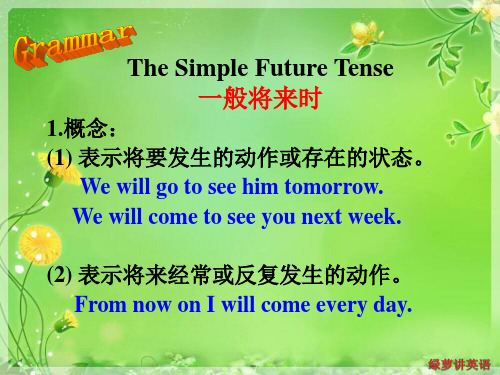will-结构将来时的用法PPT课件
合集下载
2020年六年级英语一般将来时will讲解PPT

2. -- 你妈妈这个周末去购物吗? -- 不,她不去。
-- _W__il_l ________ your mother go shopping this weekend? -- No, _s_h_e_________ _w_o_n_’t________.
3. -- 下周六你在这吗? -- 我不在。我要去拜访我的老师。
2. The man will come here.
变成否定句: __T_h_e__m_a_n_w__il_l _n_ot__c_o_m_e__h_e_re_.____________________________ 变成一般疑问句:__W_i_ll_t_h_e__m_a_n__co_m__e_h_e_r_e_?___________________________ 肯定回答:__Y_e_s_, _h_e_w__il_l._________ 否定回答:__N_o_,_h_e_w__o_n_’t_. ____________
4. What will your little brother does? _d_o_______
5. There will is a football match. _b_e_______
二、根据中文意思,把下面的句子补充完整。
1. --下个星期二你会做什么? -- 我会去踢足球。
--What _w_i_ll________ you _d_o__________ next week? -- I _w_i_ll_________ play football.
-- _W__il_l________ you _b_e__________ here this Saturday? -- No, _I__ w__o_n_’t_. I _w_i_ll_ _v_i_s_it________ my teacher.
-- _W__il_l ________ your mother go shopping this weekend? -- No, _s_h_e_________ _w_o_n_’t________.
3. -- 下周六你在这吗? -- 我不在。我要去拜访我的老师。
2. The man will come here.
变成否定句: __T_h_e__m_a_n_w__il_l _n_ot__c_o_m_e__h_e_re_.____________________________ 变成一般疑问句:__W_i_ll_t_h_e__m_a_n__co_m__e_h_e_r_e_?___________________________ 肯定回答:__Y_e_s_, _h_e_w__il_l._________ 否定回答:__N_o_,_h_e_w__o_n_’t_. ____________
4. What will your little brother does? _d_o_______
5. There will is a football match. _b_e_______
二、根据中文意思,把下面的句子补充完整。
1. --下个星期二你会做什么? -- 我会去踢足球。
--What _w_i_ll________ you _d_o__________ next week? -- I _w_i_ll_________ play football.
-- _W__il_l________ you _b_e__________ here this Saturday? -- No, _I__ w__o_n_’t_. I _w_i_ll_ _v_i_s_it________ my teacher.
一般将来时态讲解(共25张PPT)

• I wonder what will happen. • 我不知道将会发生什么事。
• I don't think the test will be very difficult. 。
②用于“祈使句 + and + 陈述句” 中
I don’t think it will rain this afternoon.
I am hungry. I think I’ll have something to eat.
表示看法,观点
“There be”句型的一般将来时 肯定句: There will be +名词+其他成份 [注意]:无论后面加单数名词或复数形式,be都必须用原形。
shall适用于第一人称I,We;而will适用于所有人称。 通常可以用will来代替shall。 will,shall均可缩写为:'ll,如:
I will= I'll; she will = she’ll;will not 和shall not分别可以 缩写为 won't 和shan't。
1.一般将来时的用法
4. be about to + 动词原形。 表示 (1)“即将做”或“马上做”
(2)因此,句子不能再用时间状语。
Don’t leave. Li Lei is about to come. 不要走了,李蕾就要来了。 Be quiet. The concert is about to start. 安静下来,音乐演唱会就要开始了。
• My uncle will come to see me every Saturday.
• 我叔叔每个星期六都会来看我。
• The students will have five English classes per week this term.
• I don't think the test will be very difficult. 。
②用于“祈使句 + and + 陈述句” 中
I don’t think it will rain this afternoon.
I am hungry. I think I’ll have something to eat.
表示看法,观点
“There be”句型的一般将来时 肯定句: There will be +名词+其他成份 [注意]:无论后面加单数名词或复数形式,be都必须用原形。
shall适用于第一人称I,We;而will适用于所有人称。 通常可以用will来代替shall。 will,shall均可缩写为:'ll,如:
I will= I'll; she will = she’ll;will not 和shall not分别可以 缩写为 won't 和shan't。
1.一般将来时的用法
4. be about to + 动词原形。 表示 (1)“即将做”或“马上做”
(2)因此,句子不能再用时间状语。
Don’t leave. Li Lei is about to come. 不要走了,李蕾就要来了。 Be quiet. The concert is about to start. 安静下来,音乐演唱会就要开始了。
• My uncle will come to see me every Saturday.
• 我叔叔每个星期六都会来看我。
• The students will have five English classes per week this term.
一般将来时PPT课件

A. will go B. won’t go C. can go D. went
一、单项选择
(C) 1. There __________ a meeting tomorrow afternoon.
A. will be going to B. will going to be C. is going to
shall常用于第一人称. shall
否定式:shall not = shan’t
will常用于第二、三人称,但在 will 口语中各种人称都可以用will.
否定式:will not = won’t
四、现_在___进__行___时态 + 表示将来的时 间状语也可以表示将来。
五、There be 句型的一般将来时态 的结构:there +is_g_o_in_g_to_ + be + 名词或there + will+ be + 名词。
begoingto表示根据主观判断将来肯定发生的事情表示根据主观判断将来肯定发生的事情will表示客观上将来势必发生的事情
The Simple Future Tense
一、一般将来时表示将来某一 时刻的动作,状态以及打算。 该时态一般与表示将来意义 的时间状语连用。如:
tomorrow, this month, the day
next week.
A. will be; is
B. is; is C. will be; will be D.
is; will be
(D) 4. There ________ a dolphin show in the zoo
tomorrow evening.
A. was B. is going to have C. will have D. is going
一、单项选择
(C) 1. There __________ a meeting tomorrow afternoon.
A. will be going to B. will going to be C. is going to
shall常用于第一人称. shall
否定式:shall not = shan’t
will常用于第二、三人称,但在 will 口语中各种人称都可以用will.
否定式:will not = won’t
四、现_在___进__行___时态 + 表示将来的时 间状语也可以表示将来。
五、There be 句型的一般将来时态 的结构:there +is_g_o_in_g_to_ + be + 名词或there + will+ be + 名词。
begoingto表示根据主观判断将来肯定发生的事情表示根据主观判断将来肯定发生的事情will表示客观上将来势必发生的事情
The Simple Future Tense
一、一般将来时表示将来某一 时刻的动作,状态以及打算。 该时态一般与表示将来意义 的时间状语连用。如:
tomorrow, this month, the day
next week.
A. will be; is
B. is; is C. will be; will be D.
is; will be
(D) 4. There ________ a dolphin show in the zoo
tomorrow evening.
A. was B. is going to have C. will have D. is going
初中英语一般将来时will和be going to讲解课件

句型:特殊疑问词+一般疑问句 -How are they going to school tomorrow? -By bike. -What is he going to do next Sunday? -He is going to read books. -When are you going to buy a new bike? -Tomorrow.
going to, 而多用will。 如:
If any beasts comes at you, I'll stay with you and help you.
1.Bob and I _w__il_l_m__a_tc_h__(watch) an action movie tomorrow.
2.We __w__il_l _b_e____(be) able to go to space in the future.
时间状语:
tomorrow 明天
next week 下周
next month 下个月 next year 明天
before不久
soon 不久
the day after tomorrow 后天
the year after next 后年
the week after next 下下周
基本句型: 肯定句: 主语 + will +v. 原形 否定句: 主语 + will +not + v.原形 一般疑问句: will +主语 + v.原形
3.The childrenw_i_ll_d_i_s_cu__ss__(discuss) the plan after school.
He is seriously ill. He is going to die. He will be twenty years old.
going to, 而多用will。 如:
If any beasts comes at you, I'll stay with you and help you.
1.Bob and I _w__il_l_m__a_tc_h__(watch) an action movie tomorrow.
2.We __w__il_l _b_e____(be) able to go to space in the future.
时间状语:
tomorrow 明天
next week 下周
next month 下个月 next year 明天
before不久
soon 不久
the day after tomorrow 后天
the year after next 后年
the week after next 下下周
基本句型: 肯定句: 主语 + will +v. 原形 否定句: 主语 + will +not + v.原形 一般疑问句: will +主语 + v.原形
3.The childrenw_i_ll_d_i_s_cu__ss__(discuss) the plan after school.
He is seriously ill. He is going to die. He will be twenty years old.
一般将来时ppt课件

02 一般将来时的基本用法
表示将来要发生的行为
要点一
常见的助动词“will”和 “shall”可以用于表示将…
“I will go to the store tomorrow.”(我明天要去商店。 )
要点二
“be going to”也可以用于表达 将来要发生的行…
“It is going to rain later.”(待会儿要下雨了。)
肯定句
I am going to swim in the afternoon.
否定句
They are not going to watch the movie.
疑问句
Are you going to meet your friend tomorrow?
主语+be to+动词原形
肯定句
You are to hand in your homework tomorrow.
表示邀请或建议
总结词
表示邀请或建议某人做某事,通常用于 口语交流中。
VS
详细描述
在口语交流中,我们经常使用一般将来时 态来表示邀请或建议,例如:“Would you like to come to my house for dinner tomorrow?”(明天你想来我家 吃晚饭吗?)或者“Let's go for a walk after dinner.”(晚饭后我们去散步吧。 )
02
在一些情况下,我们也可以使用“be going to”来表达将来时
。例如
It is going to rain.(将要下雨了。)
03
构成
They are going to graduate next year.(他们将于明年毕业。)
一般将来时willppt课件

特殊疑问句:特殊疑问词+will+主语+V.原形+其他 What will your dream school have?
一般将来时will
2. There be句型的一般将来时 肯定句: There will be +名词+其他成份 无论后面加单数名词或复数形式,be必须用原形。
There will be only one country. There will be many workers in this city.
1. 结构
一般将来时will
肯定句:主语+ will +动词原形e will go to the moon.
否定句:在will后面加not(will not可缩写为 won’t) They will not (won’t) use books.
一般疑问句:will提到句子主语前,结尾变问号 Will students go to school in the future?
(2)表示将来某一段时间内经常的动作或状态: The students will come and work in the lab once a week. We will come and work in this factory every year.
否定句:在will后面加not There won’t be only one country.
一般疑问句:把will提到there之前 Will there be only one country? Yes, there will. / No, there won’t.
一般将来时will
3. 用法 (1)表示将来某一时刻的动作或状态: We will come to see you the day after tomorrow. There will be a wonderful show next week.
一般将来时(8张PPT)初中英语专项复习课件
肯定句:主语+ will +do+其他 People will have robots in their homes. 否定句:主语+ will not /won't+do+其他 People will not/won’t have robots in their 一般疑问句:Will+主语+do+其他? 肯定回答:Yes, they will. 否定回答:No, they won’t. Will people have robots in their homes?
homes.
2.而be going to +do通常用来谈论在一个较近的未来将要发生的计 划中的或是有可能发生的事。如:
I am going to visit us next month.(在一个较近的未来将要发生 的计划中的事)
It is so cloudy. I think it’s going to rain. (有可能发生的事)
一般将来时
初中英语专项复习
一、一般将来时的意义: 用来描述一个即将要发生的动作;谈论未来的计划和打算。
二、一般将来时的基本结构: will/shall+动词原形
be going to+动词原形
常见时间状语:
next Tuesday next week the coming Sunday next year this afternoon
tomorrow tonight in a few minutes in the future in five years
三、一般将来时
1.will 用于一切人称,shall只用于第一人称(I/we)。但现代英语倾向 于所有人称都使用will而不用shall。will/shall + do通常用来谈论未 来会发生的事或是正在制定的计划。 It will rain this afternoon.(未来发生) I will take an umbrella with me.(计划)
《Will一般将来时》课件
1 Positive
主语 + will + 动词
2 N eg ative
主语 + will not + 动词
3 Question
Will + 主语 + 动词
一般将来时的用法
表达意愿
我将会去参加明天的会 议。
预测未来
明天会下雨。
提出建议
你应该明天早点休息。
例句和练习
1
例句
明天我将和朋友去看电影。
例句
意愿、预测、建议等
技巧
表达自信、使用时间表达、 多练习
使用一般将来时的技巧
Be confident
积极表达信心和决心。
Use tim e ex p res s io n s
明天、将来、下个星期 等词汇可以增强时态的 表达。
Practice with exercises
多做一些练习可以更好 地掌握一般将来时的用 法。
总结和要点
构成
will + 动词
用法
2
他明天不会来上班。
3
练习
请用一般将来时造句:
明天我们将去旅行。
注意事项和常见错误
1 D on't forg et
the subject
错误:Will go to the party.
正确:I will go to the party.
2 D on't use
c o n trac tio n s in form al writing
错误:I'll finish it tomorrow.
正确:I will finish it tomorrow.
一般将来时ppt课件
表示预测和推测
预测
一般将来时可以用来表示对未来事件的 预测,例如“It will rain tomorrow”( 明天会下雨)。
VS
推测
在根据现有信息对未来进行推测时,也可 以使用一般将来时,例如“He will win the race”(他会赢得比赛)。
表示意愿和承诺
要点一
意愿
一般将来时可以用来表示个人的意愿和决定,例如“I will help you”(我会帮助你)。
be going to + 动词原形
用法
表示根据当前情况或计划,未来一定会发生的动作或状态。
例句
We are going to have a picnic next week.(我们下周要去 野餐。)
其他形式
用法
除了以上两种基本形式,还有其他一 些表达一般将来时的结构,如使用现 在进行时表示未来安排的动作等。
04 一般将来时的用 法
表示未来的计划和打算
计划
一般将来时可以用来表示未来的计划和打算,例如“I will go to the movies tonight”(我今晚会去看电影) 。
安排
在描述已经安排好的活动时,也可以使用一般将来时,例如“We are meeting at 3pm”(我们下午3点见面) 。
won’t go to the movies tonight.”(今晚我不会去看
电影。)
在“be going to”结构中, 否定形式为“am not going to”、“are not going to” 等。例如:“I am not going to the movies tonight.”(今晚我不打算去 看电影。)
要点二
承诺
高中英语一般将来时 PPT课件 图文
breaking that chair)
• ③ be + 动词不定式 • 这一结构中的be,只有现在式 (am, is, are) 和
过去式 (was, were) 两种形式。
• a. 表示按计划或安排将要发生的动作
• The highway is to be open to traffic in May. • 这条公路将在五月份通车。
• ①用于“பைடு நூலகம் expect, I‘m sure, I think, I wonder + 宾语从 句”中
• Don't worry about the exam. I'm sure you'll pass. • 不要担心这次考试,我确信你会通过的。 • I wonder what will happen. • 我不知道将会发生什么事。 • I don't think the test will be very difficult. • 我想这次测验不会太难。
• Flowers will die without water. • 没有水花会枯死的。 • Water will change into ice at 0℃. • 水在零摄氏度就会结冰。 • This will be your sister, I guess. • 我猜想这是你姐姐。
(三)一般将来时的常用结构
• She will get better.
• 她的病会好的。(认为最终会恢复健康的)
• 2)will表示将来,通常是指事先无计划的意图,是临时决定的;
be going to则表示事先有计划的意图,是经过考虑的。 • — George phoned while you were out. • 你外出的时候乔治打电话来的。 • — Ok. I'll phone him back. • 好的,我给他回电话。(临时决定) • — Matthew phoned while you were out. • 你外出的时候马修打电话来了。 • — Yes, I know. I'm going to phone him back. • 是的,我知道了。我准备给他回电话。(早有安排) • 但在正式文体中,要用will来表示事先安排的动作。 • The meeting will begin at 10:00 a.m.. • 会议将在10点开始。 • Coffee will be served from 9:30 from today onwards. • 从今天起9:30开始供应咖啡。
• ③ be + 动词不定式 • 这一结构中的be,只有现在式 (am, is, are) 和
过去式 (was, were) 两种形式。
• a. 表示按计划或安排将要发生的动作
• The highway is to be open to traffic in May. • 这条公路将在五月份通车。
• ①用于“பைடு நூலகம் expect, I‘m sure, I think, I wonder + 宾语从 句”中
• Don't worry about the exam. I'm sure you'll pass. • 不要担心这次考试,我确信你会通过的。 • I wonder what will happen. • 我不知道将会发生什么事。 • I don't think the test will be very difficult. • 我想这次测验不会太难。
• Flowers will die without water. • 没有水花会枯死的。 • Water will change into ice at 0℃. • 水在零摄氏度就会结冰。 • This will be your sister, I guess. • 我猜想这是你姐姐。
(三)一般将来时的常用结构
• She will get better.
• 她的病会好的。(认为最终会恢复健康的)
• 2)will表示将来,通常是指事先无计划的意图,是临时决定的;
be going to则表示事先有计划的意图,是经过考虑的。 • — George phoned while you were out. • 你外出的时候乔治打电话来的。 • — Ok. I'll phone him back. • 好的,我给他回电话。(临时决定) • — Matthew phoned while you were out. • 你外出的时候马修打电话来了。 • — Yes, I know. I'm going to phone him back. • 是的,我知道了。我准备给他回电话。(早有安排) • 但在正式文体中,要用will来表示事先安排的动作。 • The meeting will begin at 10:00 a.m.. • 会议将在10点开始。 • Coffee will be served from 9:30 from today onwards. • 从今天起9:30开始供应咖啡。
- 1、下载文档前请自行甄别文档内容的完整性,平台不提供额外的编辑、内容补充、找答案等附加服务。
- 2、"仅部分预览"的文档,不可在线预览部分如存在完整性等问题,可反馈申请退款(可完整预览的文档不适用该条件!)。
- 3、如文档侵犯您的权益,请联系客服反馈,我们会尽快为您处理(人工客服工作时间:9:00-18:30)。
year, in 100 years 等。
14
典例探究
They will visit the car factory next week. 肯定句
They will not/won't visit the car factory next week. 否定句
Will they visit the car factory next week?
2
典例探究
They will have a test next Tuesday. 下周二他们要考试。 People will have robots in their homes. 人们的家里将会有机器人。 There will be only one country. 世界将会只有一个国家。 Will people have robots? 将来人们会拥有机器人吗? What will the future be like? 未来将会是什么样的?
18
自主归纳
1.指已计划过或思考过的意图或打
be going to+动词原形
算 2.可表示客观迹象表明马上要发生
的事
will+动词原形
1.表示未事先思考或未计划而临时 做出的决定
2.表明说话者的主观意愿
19
温馨提示 1. 当主语为第一人称时,通常用shall, 其否定形式为shall not=shalln't; will常用于第二人称和第三人称,但是在口语 中各种人称都可用will,其否定形式为will not=won't。例: They will study at home on computers next week. I shall go to the book store. 2.在含有条件状语从句或时间状语从句的复合句中,主句 用将来时,从句用一般现在时表将来(主将从现),且其 中的将来时用will而不用be going to。例: My father will send me a new bike when I am tall enough.
12
There will be fewer high buildings.
13
典例探究
We will go home tomorrow afternoon. Will you be at home at seven this evening? The teachers will have a meeting next Monday. Who will teach you English this year? Everything will be free in 100 years. 自主归纳 通过观察以上例句可知,常与will 连用的时间状语 有: tomorrow afternoon, this evening, next Monday, this
初中英语 八年级上册 Unit 7 Will people have robots? will 结构的一般将来时用法
1
复习巩固
他打算明年去上表演课。 He is going to take acting lessons next year.
他们下星期不准备去参观汽车工厂。 They are not going to visit the car factory next week. 这周末有新电影吗? Are there going to be any new movies this weekend? 下个学期谁会学习日语? Who is going to study Japanese next term?
7
Students will study at home on computers.
8
People will have robots in their homes.
9
There will be more trees.
10
There will be less pollution.
11
There will be fewer people.
Yes, they will./ No, they won't. 一般疑问句
What will they visit next week?
特殊疑问句
15
自主归纳 研读以上例句可知,will 的各种句式结构如下:
肯定句 主语+will+ 动词原形 . 否定句 主语+will+ not +动词原形. 一般疑问句 Will +主语+动词原形? 特殊疑问句 特殊疑问词 +will+(+主语)+动词原形?
16
温馨提示
1. will not 可以缩写成won't。 2. 对于will结构的一般将来时来说,一般疑问句的肯定 回答用“Yes, 主语+ will.”;否定回答有“No, 主语 +won't.”。
17
典例探究
will与be going to的区别
I'm going to see him tomorrow. 我打算明天去看他。(事先 经过考虑) I'll answer the door.我去开门。(未经事先考虑) Look at the clouds. It is going to rain.看看这些云,要下雨了。 (客观迹象表明要发生) I hope it will be warm tomorrow.我希望明天能暖和起来。 (主观意愿)
3
整体感悟 从以上例句可以看出,除 be going to可用于表示将来 时之外, will 也可用于表示将来时,意为 将要 , 后接 动词原形 。
4
What will in 100 years?
5
The world will become one country.
6
People will live up to be over 100 years old.
20
学以致用 用所给动词的适当形式填空
1. I will have (have) a meeting this afternoon. 2. They will watch (watch) a basketball match tomorrow afternoon. 3. Lily will study (study) Japanese next term. 4. There will be (be) two new movies this weekend. 5. I will leave (leave) for Chengdu this afternoon.
14
典例探究
They will visit the car factory next week. 肯定句
They will not/won't visit the car factory next week. 否定句
Will they visit the car factory next week?
2
典例探究
They will have a test next Tuesday. 下周二他们要考试。 People will have robots in their homes. 人们的家里将会有机器人。 There will be only one country. 世界将会只有一个国家。 Will people have robots? 将来人们会拥有机器人吗? What will the future be like? 未来将会是什么样的?
18
自主归纳
1.指已计划过或思考过的意图或打
be going to+动词原形
算 2.可表示客观迹象表明马上要发生
的事
will+动词原形
1.表示未事先思考或未计划而临时 做出的决定
2.表明说话者的主观意愿
19
温馨提示 1. 当主语为第一人称时,通常用shall, 其否定形式为shall not=shalln't; will常用于第二人称和第三人称,但是在口语 中各种人称都可用will,其否定形式为will not=won't。例: They will study at home on computers next week. I shall go to the book store. 2.在含有条件状语从句或时间状语从句的复合句中,主句 用将来时,从句用一般现在时表将来(主将从现),且其 中的将来时用will而不用be going to。例: My father will send me a new bike when I am tall enough.
12
There will be fewer high buildings.
13
典例探究
We will go home tomorrow afternoon. Will you be at home at seven this evening? The teachers will have a meeting next Monday. Who will teach you English this year? Everything will be free in 100 years. 自主归纳 通过观察以上例句可知,常与will 连用的时间状语 有: tomorrow afternoon, this evening, next Monday, this
初中英语 八年级上册 Unit 7 Will people have robots? will 结构的一般将来时用法
1
复习巩固
他打算明年去上表演课。 He is going to take acting lessons next year.
他们下星期不准备去参观汽车工厂。 They are not going to visit the car factory next week. 这周末有新电影吗? Are there going to be any new movies this weekend? 下个学期谁会学习日语? Who is going to study Japanese next term?
7
Students will study at home on computers.
8
People will have robots in their homes.
9
There will be more trees.
10
There will be less pollution.
11
There will be fewer people.
Yes, they will./ No, they won't. 一般疑问句
What will they visit next week?
特殊疑问句
15
自主归纳 研读以上例句可知,will 的各种句式结构如下:
肯定句 主语+will+ 动词原形 . 否定句 主语+will+ not +动词原形. 一般疑问句 Will +主语+动词原形? 特殊疑问句 特殊疑问词 +will+(+主语)+动词原形?
16
温馨提示
1. will not 可以缩写成won't。 2. 对于will结构的一般将来时来说,一般疑问句的肯定 回答用“Yes, 主语+ will.”;否定回答有“No, 主语 +won't.”。
17
典例探究
will与be going to的区别
I'm going to see him tomorrow. 我打算明天去看他。(事先 经过考虑) I'll answer the door.我去开门。(未经事先考虑) Look at the clouds. It is going to rain.看看这些云,要下雨了。 (客观迹象表明要发生) I hope it will be warm tomorrow.我希望明天能暖和起来。 (主观意愿)
3
整体感悟 从以上例句可以看出,除 be going to可用于表示将来 时之外, will 也可用于表示将来时,意为 将要 , 后接 动词原形 。
4
What will in 100 years?
5
The world will become one country.
6
People will live up to be over 100 years old.
20
学以致用 用所给动词的适当形式填空
1. I will have (have) a meeting this afternoon. 2. They will watch (watch) a basketball match tomorrow afternoon. 3. Lily will study (study) Japanese next term. 4. There will be (be) two new movies this weekend. 5. I will leave (leave) for Chengdu this afternoon.
